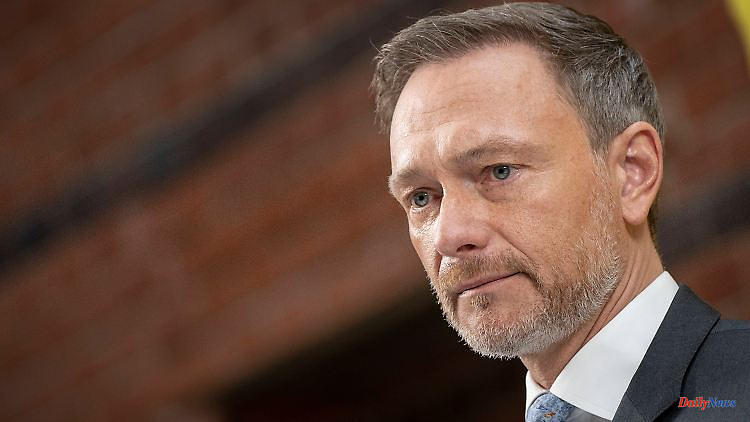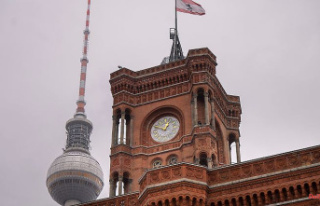Another bad news for the Free Democrats: In the trend barometer, the FDP has to give up one point and is now only at 6 percent. The level of satisfaction among Germans with the work of Finance Minister Lindner is also limited.
Two days after the Berlin election, the FDP loses a point in the RTL and ntv trend barometer. However, the values of this survey are not a consequence of the election to the House of Representatives in the capital: They were collected from February 7th to 13th, i.e. partly before the election Sunday.
The values for all other Bundestag parties remain unchanged compared to the previous week. Only the other parties gain a point.
If the Bundestag were elected this week, the parties could expect the following result: CDU/CSU 28 percent (Bundestag election in September 2021: 24.1 percent), SPD 21 percent (25.7 percent), Greens 18 percent (14.8 percent), AfD 13 percent (10.3 percent), FDP 6 percent (11.5 percent), Left 5 percent (4.9 percent). 9 percent of voters (8.7 percent) would choose other parties. At 23 percent, the proportion of non-voters and undecided roughly corresponds to the proportion at the last federal election (23.4 percent).
In terms of Chancellor preferences, incumbent Olaf Scholz can improve his value again this week. In the candidate constellation against CDU leader Friedrich Merz and Economics Minister Robert Habeck from the Greens, Scholz is still clearly ahead with 27 percent, which is one point more than in the previous week. 20 percent of Germans would still choose Merz and Habeck if they could elect the chancellor directly.
If instead of Habeck Federal Foreign Minister Annalena Baerbock stood for the Greens, Scholz would still be 30 percent ahead. Merz would remain unchanged at 22 percent, Baerbock at 19 percent, an increase of one point compared to the previous week.
The SPD is also making slight gains in the attribution of political competence. When asked which party was best able to deal with the problems in Germany, 15 percent named the SPD, one point more than a week earlier. An unchanged 11 percent trust the Union parties or the Greens with political competence. 3 percent name the FDP, 6 percent one of the other parties. At 54 percent, more than half of the Germans still don't trust any party to deal with the problems in Germany. In the previous week, the figure was 56 percent.
Forsa also asked this week how satisfied the Germans are with individual members of the federal cabinet. 42 percent of Germans are currently satisfied with the work of Chancellor Scholz, more than in December (36 percent). 56 percent (compared to 63 percent in December) are less or not at all satisfied with Scholz's work.
Only the supporters of the SPD (82 percent) and - to a lesser extent - those of the Greens (55 percent) still mostly agree with Scholz's work. Of the supporters of the third traffic light party, the FDP, 24 percent are significantly less satisfied with Scholz's work than the supporters of the Union parties (40 percent).
As in November, a similar number of Germans are satisfied (49 percent) and dissatisfied (47 percent) with the work of Federal Foreign Minister Baerbock. The majority of supporters of the Greens (86 percent) and the SPD (64 percent) agree with Baerbock's work, but not the supporters of the FDP (41 percent).
A similar number of Germans are satisfied (48 percent) and dissatisfied (46 percent) with the work of Federal Minister of Economics Habeck. Unlike Baerbock's values, Habeck's satisfaction values have improved significantly compared to last November. At that time, 40 percent were satisfied with his work and 53 percent were dissatisfied. However, only the supporters of the Greens (79 percent) and the SPD (70 percent) appreciate Habeck's work.
Only 33 percent are still satisfied with the work of Federal Finance Minister Christian Lindner, while 59 percent are not satisfied. The majority of FDP supporters (71 percent) agree with Lindner's work as finance minister, while only a minority of supporters of the SPD (34 percent) and the Greens (27 percent) agree with his work. The Union supporters (45 percent) are satisfied with Lindner's work more often than the supporters of the two traffic light parties.
Significantly more Germans are dissatisfied (53 percent) than satisfied (28 percent) with the work of Federal Minister of the Interior Nancy Faeser from the SPD. In contrast to the work of all other cabinet members surveyed, more supporters of their own party are dissatisfied (43 percent) than satisfied (37 percent) with Faeser's work.
47 percent of Germans are satisfied with the work of the new Federal Defense Minister Boris Pistorius and only 18 percent are not satisfied. 35 percent do not yet dare to make an assessment. With the exception of the AfD supporters, the proportion of those who agree with Pistorius' work clearly outweighs the proportion of those who are not satisfied in all groups of voters.
The data was collected by the market and opinion research institute Forsa on behalf of RTL Germany from February 7th to 13th, 2023. Database: 2505 respondents. Statistical error tolerance: plus/minus 2.5 percentage points. Data on satisfaction with individual members of the Federal Cabinet were collected on February 9th and 10th. Database: 1002 respondents. Statistical error tolerance: plus/minus 3 percentage points.
More information about Forsa here. Forsa surveys commissioned by RTL Germany












